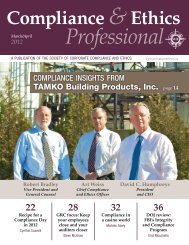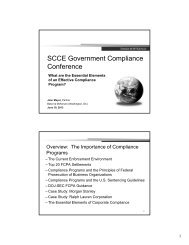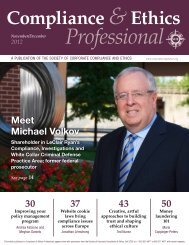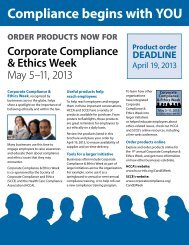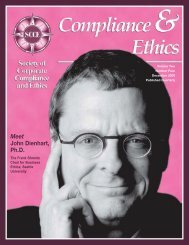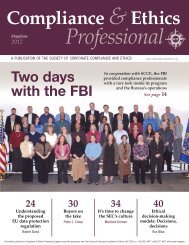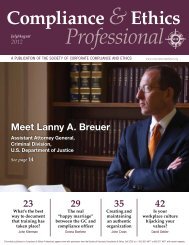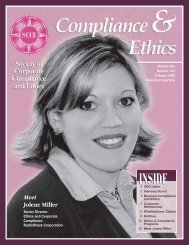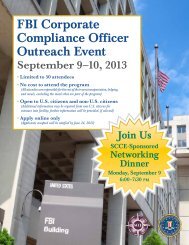Compliance &Ethics - Society of Corporate Compliance and Ethics
Compliance &Ethics - Society of Corporate Compliance and Ethics
Compliance &Ethics - Society of Corporate Compliance and Ethics
- No tags were found...
You also want an ePaper? Increase the reach of your titles
YUMPU automatically turns print PDFs into web optimized ePapers that Google loves.
Featurefilers crazy (<strong>and</strong> vice versa), but most sensibleorganizations don’t enforce uniformity. Peopleare people, <strong>and</strong> they’ll work in the way thatpromotes productivity <strong>and</strong> comfort.Some employees have sinister reasons forkeeping or deleting documents (e.g., to covertheir tracks, to help them avoid retribution,or to preserve information that may be usedagainst others). And deleters can cause problems,because they might permanently removeinformation that has business value or shouldbe retained for legal or regulatory purposes.But most filers, pilers, <strong>and</strong> deleters have goodintentions <strong>and</strong> believe that what they save hasbusiness value <strong>and</strong>/or is tied to a businessprocess. If they’re wrong, their behavior, inaddition to making themselves less productive,can drive up storage <strong>and</strong> managementcosts <strong>and</strong> the risk <strong>and</strong> expense <strong>of</strong> eDiscovery.Document hoarding is a change managementproblemKeeping the right stuff, <strong>and</strong> getting rid <strong>of</strong>unneeded, low-value information requires acombination <strong>of</strong> effective policies, processes,<strong>and</strong> technology. Perhaps most important,The downside <strong>of</strong> aggressive deletionSome IT departments react to the growth <strong>of</strong> information by aggressively deleting it accordingto established rules. For example, if files have not been accessed, classified, or changed forsome period <strong>of</strong> time (e.g., 60 days), then the information is deemed to have little or no businessvalue <strong>and</strong> is automatically deleted. The rationalizations for such behavior are threefold:··Storage space can be freed up.··Information is expunged before the organization finds itself in trouble, <strong>and</strong> as long asdeletion policies are documented, the organization can feel confident if it is challengedin court.··All employees—from the CEO on down—are (or ought to be) aware <strong>of</strong> the policies sothere should not be any surprises.<strong>Compliance</strong> & <strong>Ethics</strong> Pr<strong>of</strong>essional May/June 2013The trouble with this strategy is that the IT department cannot be certain that everythingis truly deleted. Information tends to have a long lifecycle, especially when:··the recycling <strong>of</strong> <strong>of</strong>fsite backup tapes does not match the aggressive deletion schedule;··employees can forward email messages <strong>and</strong> attachments to colleagues or send blindcopies to their personal email addresses (e.g., Gmail); <strong>and</strong>··files can be saved on USB drives, laptop storage, <strong>and</strong> at remote <strong>of</strong>fice locations, incloud-based applications like Salesforce.com or Google Drive, or burned to DVD by®employees on their home systems.The last two scenarios are examples <strong>of</strong> what we call “underground archiving” when individualsmaintain private repositories <strong>of</strong> documents, keeping information outside <strong>of</strong> the control<strong>of</strong> the organization. Underground archiving is <strong>of</strong>ten a reaction to the imposition <strong>of</strong> storagequotas or enforcement <strong>of</strong> harsh deletion rules. People will squirrel away what they deem to beimportant. We find that about 30% <strong>of</strong> Fortune 500 companies we’ve spoken with are plaguedby information that practically lives forever in underground archives. Such data <strong>and</strong> documentsare discoverable, <strong>and</strong> the costs <strong>of</strong> identifying it <strong>and</strong> recovering it can be onerous.26 www.corporatecompliance.org +1 952 933 4977 or 888 277 4977






